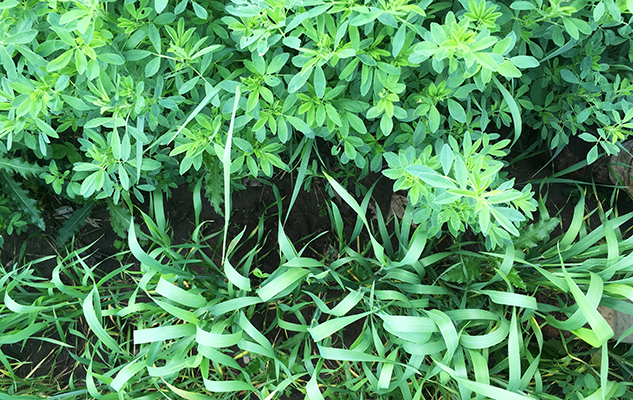By John Wepking, Meadowlark Organics and Bickford Organics
This spring has been marked by extremes: long periods of frequent rain and then weeks without a drop. Our soils have plenty of room for improvement, but I am grateful to be farming ground that is relatively balanced and has a decent level of organic matter, which allows our soils to receive moisture during heavy rains and hold that water during droughts. Without cover cropping and crop rotation we’d certainly be losing this battle.
For me, organic farming is freedom: freedom to choose the way we farm. In a conventional system, nearly everything is prescribed for you: when and what to plant, when to spray, what to spray, where to sell your grain, how much your grain is worth. You may decide to use cover crops or no-till equipment, but beyond that, conventional grain farming is relatively devoid of choice and full of expenses that we in the organic world do not rely on to the same degree. In order to succeed, we need to listen to the world around us. Nature has no shareholders, needs no profits. Given the choice of listening to nature or listening to the businesses that exist, fundamentally, to make ever-increasing profits off of farmers, I’ll listen to nature every time.

As an organic farm, we cannot spray on nitrogen, so we grow it with alfalfa and other legumes. We cannot spray for pests, so we stretch out our rotation with a diversity of crops and cover crops so that soilborne pathogens can’t thrive year after year. This approach is sustainable and employs the laws Mother Nature herself abides by. Importantly, we do not contribute to the super-weeds and super-pathogens that are propagated when farmers use chemicals in order to farm corn on corn year after year, prioritizing ease, short term revenue, and high yields at the expense of the long-term health and well-being of the soil.
When given the choice to buy a cultivator and spend much of June on a tractor or to have the year-in and year-out cost of chemicals and the catastrophic effects those chemicals have on the life of the soil, I’ll happily ride the cultivator. That said, in a farming world increasingly and wisely focused on the negative impacts of tillage, we will do what we can to till thoughtfully and limit the amount of row crop farming we do by focusing more on small grain crops and less on corn and soybeans. Having recently attempted to drive a wooden stake into the hard, lifeless dirt of a conventional no-till cornfield this spring, I can say with certainty that I prefer our measured approach to soil-building, even if it does involve some tillage.

On any farm, conventional or organic, crop rotation is critical. In an organic system, farms would quickly spiral downward without crop rotation, falling prey to increasing weeds, soilborne diseases, low organic matter, soil compaction, and low fertility. We are currently in transition from a four-year crop rotation to a six-year rotation. Our current rotation is corn, soybeans, small grains (as a spring nurse crop for alfalfa), and alfalfa. In the new six-year rotation, we are able to stretch out our alfalfa to a full three-year stand before plowing the alfalfa under in late summer in anticipation of winter wheat or spelt planting.
When planting for the food-grade market in our relatively wet region, it is important to grow our small grain crops after a non-grass crop to limit the incidence of Fusarium head blight, which produces a toxin that can disqualify a crop of wheat from food-grade use. So we grow our winter wheat after alfalfa and before corn, relying on a clover and tillage radish cover crop and our second year nitrogen credits to provide the fertility we need to plant corn after the wheat. We are also looking into ways to grow rye in place of soybeans on our highly erodible fields, which would reduce our tillage and thus our soil loss. Buckwheat is the next frontier, and we are going to play with planting it this year to see where it will fit best in our rotation.
Put simply, we farm with the tools Nature provides (plus steel, rubber, and diesel, admittedly). And we farm in concert with her, rather than foolishly attempting to bend Mother Nature to our will. She will always win, and we must learn to accept and celebrate that fact. Our goal as farmers is to succeed, as best we can, alongside her, with reverence and respect.
***
About this series: The National Young Farmers Coalition and King Arthur Flour present Heart and Grain, a new blog and film series profiling three pioneering young grain farmers. While all farmers face challenges, the high start-up costs associated with grain farming can make it an especially difficult field to enter for new and young farmers. Learn more about the series here.
About our series sponsor: Farmers are at the heart of baking. That’s why King Arthur Flour proudly supports the National Young Farmers Coalition and its mission of empowering the next generation of grain growers. As America’s appetite for sustainable food increases, King Arthur Flour is dedicated to helping farms grow with demand and strengthening people’s connection to real food.